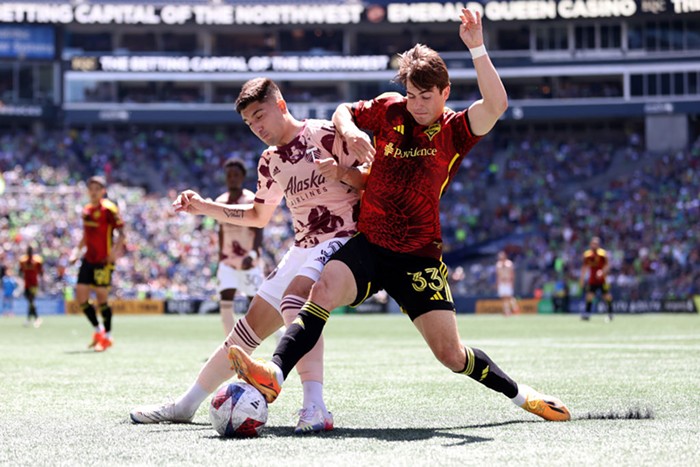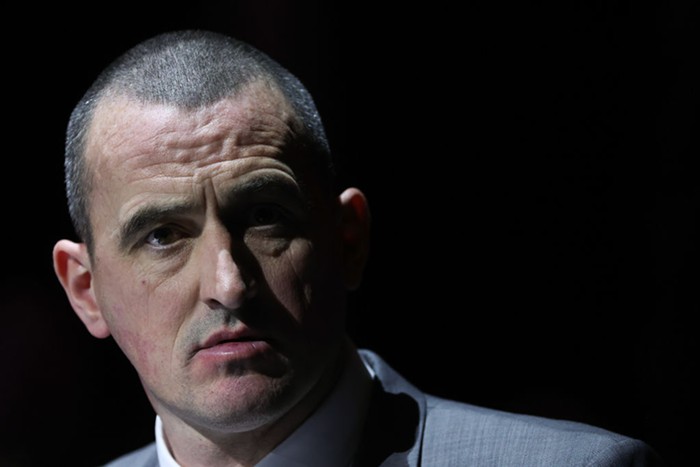
After not leading for a single minute in their last five games, the Timbers on Saturday night went to Columbus' MAPFRE Stadium, scene of their MLS Cup triumph four years ago, gained the upper hand after a half hour, and — despite a few hiccups along the way — didn't relinquish it.
It finished a cathartic 3-1, Jorge Moriera's first goal for the Timbers sealing the three points in the final minute of normal time, with Caleb Porter on the losing end of his first meeting with Giovani Savarese and his former club.
But while that was reason enough to smile on Saturday night, this victory was about far more than Porter or the three points it so crucially provides. It was about restoring belief within a team that had lost its way — and serving as a launching pad for a season that it feels like it might just now begin in earnest.
To get there, Savarese returned to an approximation of the formation that salvaged last spring: a hybrid 4-4-1-1, with Diego Valeri, restored to the starting lineup, sitting ahead of two wingers and two central midfielders tasked primarily with protecting the backline.
Unsurprisingly, given the venue and the conservatism of the Timbers' setup, Columbus started the game on the front foot — and they nearly took the lead after ten minutes when Jeff Attinella miscued a clearance, but Federico Higuain, author of a couple of spectacular goals against Portland in the past, sent his chip just wide.
It was the kind of chance that Higuain usually relishes taking. But Attinella was let off the hook, and, some 15 minutes later, he would redeem himself: making a pair of close range saves, first on a Jonathan Mensah header, then on a Robinho chance, that would loom large in shape of the game.
That's because, just moments after the save on Robinho, the Timbers struck. Diego Valeri unfurled a lovely, bending cross towards the back post where Larrys Mabiala — who scored five times last season — rose highest and got just enough on his header to get it past Zach Steffan and give Portland the lead.
That goal took the air out of Columbus, and, just three minutes after it nestled into the side netting, the Timbers, emboldened, were on the board again.
At the height of a play that started with a smart interception and excellent release pass from Zarek Valentin, Jeremy Ebobisse received the ball on top of the box and pushed it wide left for Sebastian Blanco and darted towards the center of the box.
No one picked him up, Blanco sent a low cross into his path, and Ebobisse got his feet sorted, and finished firmly past Steffan.
If the first goal was a surprise, this one was a stunner. Within a span of 180 seconds, the Timbers, who had not scored first or taken a multiple-goal lead in a game all season, had gotten out to a 2-0 lead against a Crew team that had not lost at home all season or so much as conceded a goal there since Opening Day.
Columbus staggered through the final ten minutes of the half, and the Timbers took their two-goal advantage into the break.

Diego Chara and his game-high 16 defensive actions led the way, but Mabiala and Bill Tuiloma cut out cross after cross, locked up Gyasi Zardes and, maybe for the first time this year, and looked themselves at the heart of the defense. Attinella had played his part too, but his erratic distribution, which so nearly cost the Timbers in the first half, would in the second half hand Columbus a lifeline.
Trying to spring Blanco down the wing with just over 20 minutes remaining, Attinella raced to the top of his penalty area and threw an outlet that was easily intercepted by Pedro Santos — whose chip towards the Timbers' empty net, unlike Higuain's in the first half, was on the money.
With that, the Crew were within a goal. But while the home team had the momentum, it was the Timbers who would have the final word.
In the first minute of stoppage time, substitute Tomas Conechny held the ball in the corner and worked it to Blanco, who picked out Cristhian Paredes in the box. The Paraguayan shot faked, then slid a pass towards Jorge Moreira — who set himself, and blasted a shot into the top corner. It was over.
Porter's analysis minutes later was as predictable as a sunrise: the scoreline didn't "tell the story of the game." The numbers, to a certain degree, backed him up. The Crew had 58 percent possession, completed more than 560 passes, and generally played sound soccer.
But they did not, in truth, generate all that many clear-cut chances from open play. Attinella's unforced distribution errors aside, the Timbers' defense marshaled the game well — and the reaction in their locker room after it was over spoke volumes.
Ebobisse, who is slowly but surely coming into his own as a professional, had the standout quote, pronouncing that this victory — won in front of an announced crowd of barely more than 11,000 on a cold, cloudy April night halfway across the country — "feels as good as any win that we’ve had."
Coming from a player who less than six months ago was scoring at Providence Park in a playoff game against Seattle, it was a strong statement — and it was echoed, to varying degrees, by every player who spoke to the media postgame.
In truth, though, you wouldn't have needed anything but the images of the celebrations that greeted Moriera's clinching goal to tell you that this victory meant a tremendous amount to Savarese, his staff, and his team. If you didn't know better, you would have thought it was November.
Given how they'd started the season, given the pressure they'd put themselves under, the intensity of the reaction was entirely appropriate. It was also, considering the emptiness with which they played in San Jose two weeks ago, appropriately affirming.
The Timbers still have a long way to go on this road trip. They'll be at Toronto next weekend and Real Salt Lake the week after that, then Vancouver and Houston. The grand re-opening of Providence Park is still nearly 50 days away.
But in these 90 minutes, Portland played with the kind of basic competence and desire that suggests that the grand re-opening — and the many home games set to follow it — will be well worth watching. The Timbers, for the moment, have new life.
















